Advertisement
Program at William James College tries to reduce veteran suicide by focusing on relationship to guns
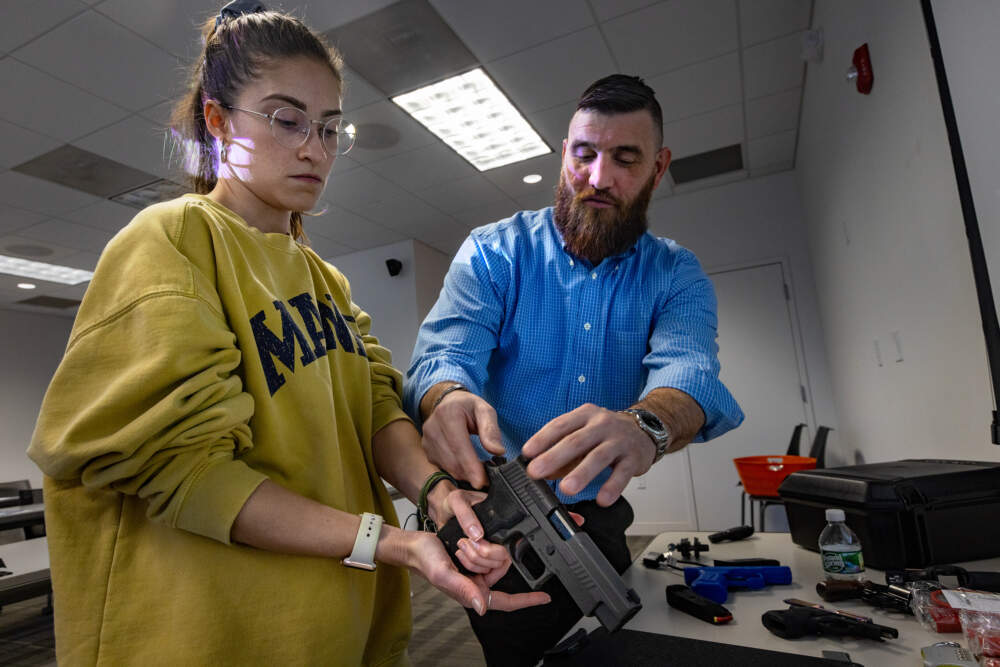
In a classroom at William James College in Newton, Army veteran and certified firearms safety instructor Kevin Lambert showed Maeve Cardwell the workings of a 9-millimeter pistol and how to safely hold it.
“You keep it pointed in a safe direction, finger off the trigger," Lambert said, as Cardwell picked up the handgun.
Cardwell is a clinical psychology doctoral candidate at William James, which specializes in degrees for mental health clinicians. She and a dozen or so others — including veterans' family members, social service providers and clinicians — took this one-day class to learn more about preventing suicide among vets.
Veterans in the U.S. die by suicide at a much higher rate than the general population, and a higher percentage of vets who kill themselves do so with a gun. That’s the case in Massachusetts, as well.
At first it might seem surprising that a class on how to prevent suicides would involve handling firearms. But the sole focus of the program, which is run by three veterans, is to get people who interact with vets comfortable talking to them about guns and their personal safety as a way of reducing suicide.
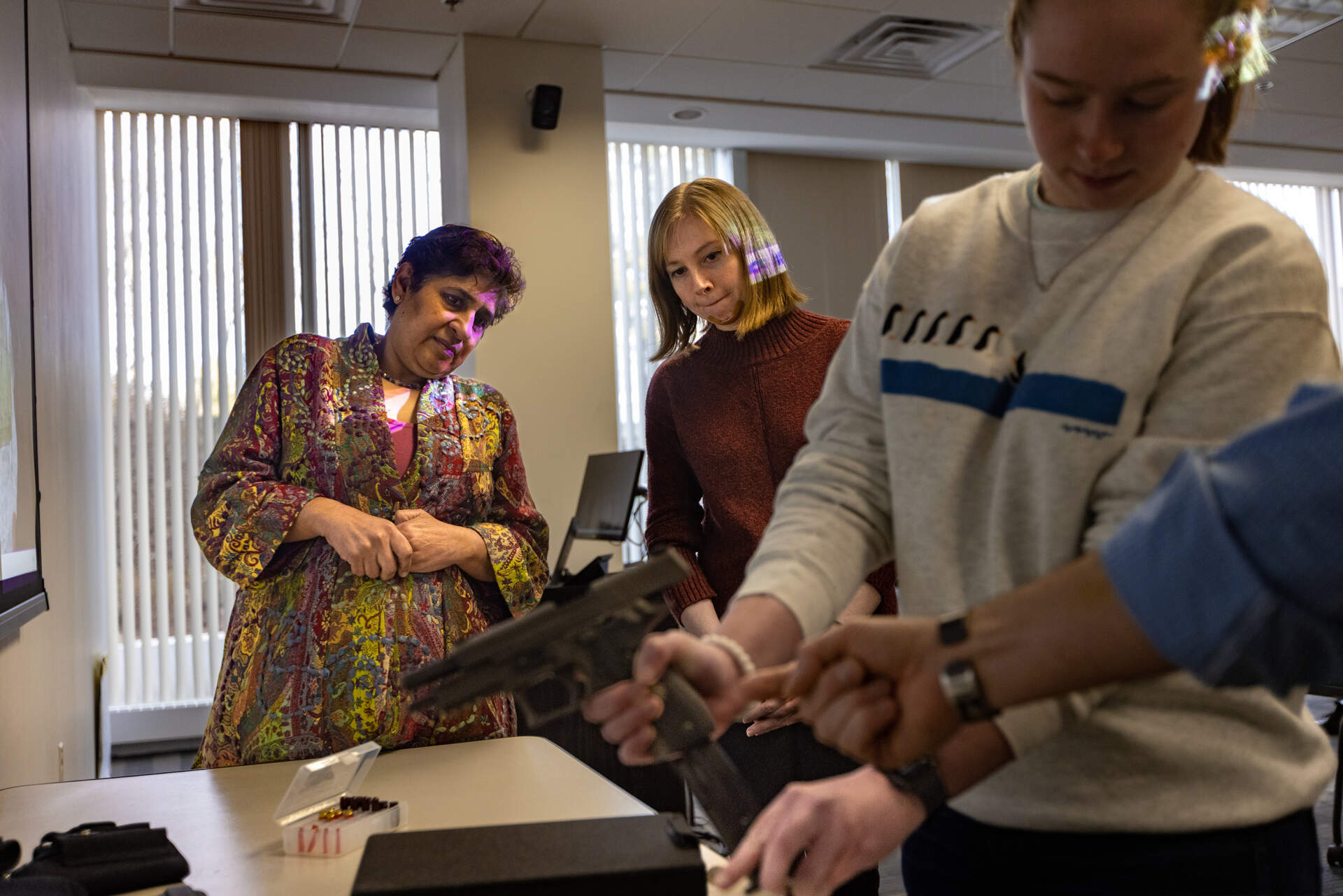
People are often uncomfortable around the topic of guns, Lambert said.
“Because it's so politicized, and there's usually an agenda with it," he added. "You know, we're very clear when we have these conversations — there are great groups that do advocacy on both sides of [the gun issue] if you want to join it. When you come to this training, it's not about that."
What the class does focus on is the vocabulary and the laws surrounding guns, and veterans’ relationship with firearms. Lambert — who served in an infantry unit and deployed to Iraq — told the class that bond starts in boot camp.
“This was embedded in our brain that if we don't have our weapon, those around us can get killed. And it is our job to protect," he said. "We went to chow with our weapon, we called home with our weapon, we did PT with our weapon.”
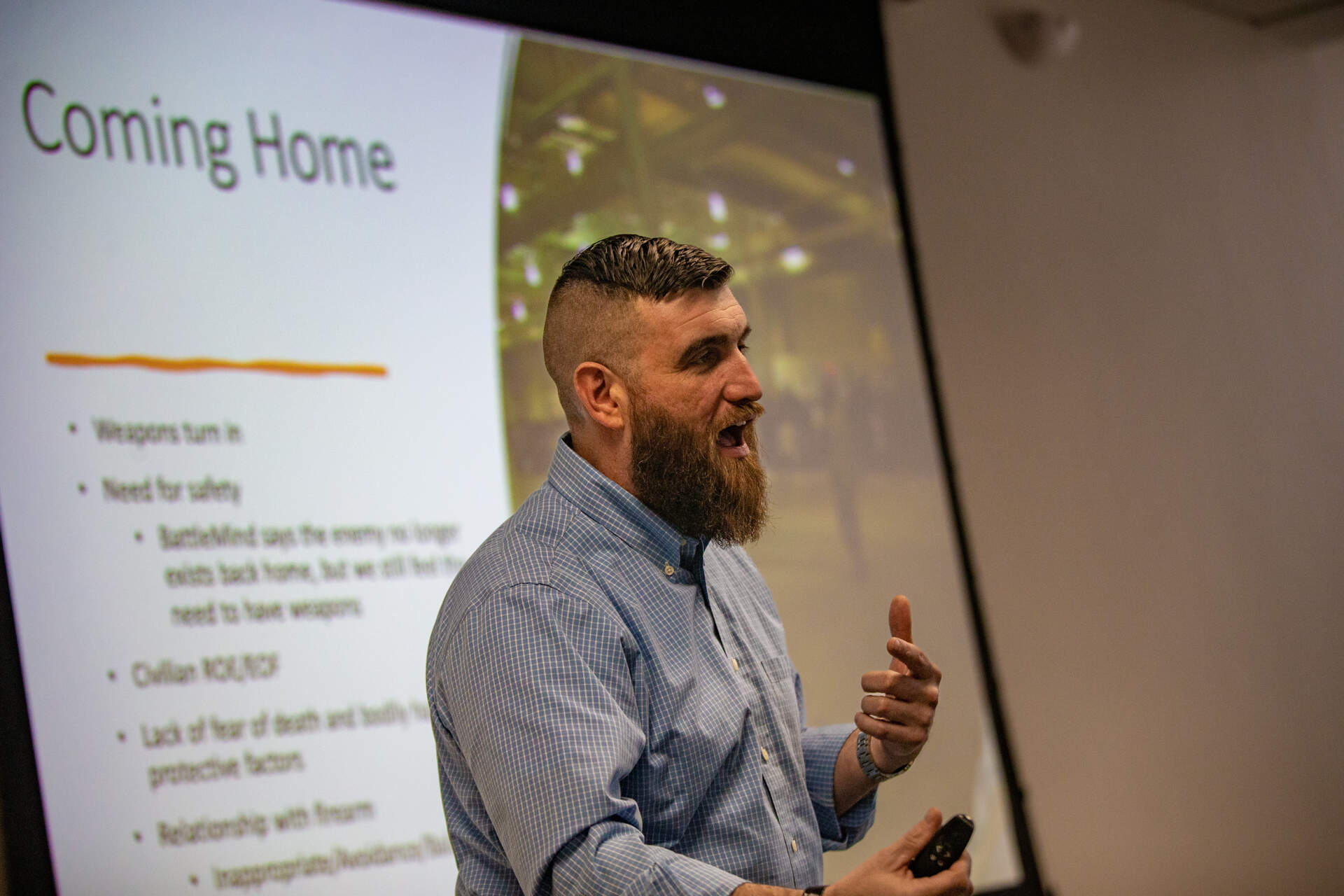
So, when their military service ends, many veterans naturally still want to own a gun, Lambert explained.
Cardwell, the graduate student – who’s not a veteran – said she found it helpful to learn how a member of the military comes to think about their firearm.
“Because it's not just, ‘Well, I want to have this gun to protect myself.’ It's been ingrained in [military personnel] at such, like, a core level, that this is almost an extension of [them] as a human being, right?" she said. "Like, that kind of lends a different understanding of the importance of having that firearm … in a way that I, as a civilian, wouldn't understand.”
The instructors hope that understanding leads to conversations with veterans about safer gun storage — exploring whether they might take steps such as keeping their guns locked up, maybe even separate from the ammunition, or use trigger locks.
The goal is to create space between the veteran and the weapon, and time between thoughts and actions, in case the vet reaches an emotional breaking point.
Advertisement
“It's important to have the discussion before the crisis, because when you're in crisis, you can't think," instructor Jenny D’Olympia told the students. "You're only feeling. You're in the pain and thinking there's no way out of this pain.”
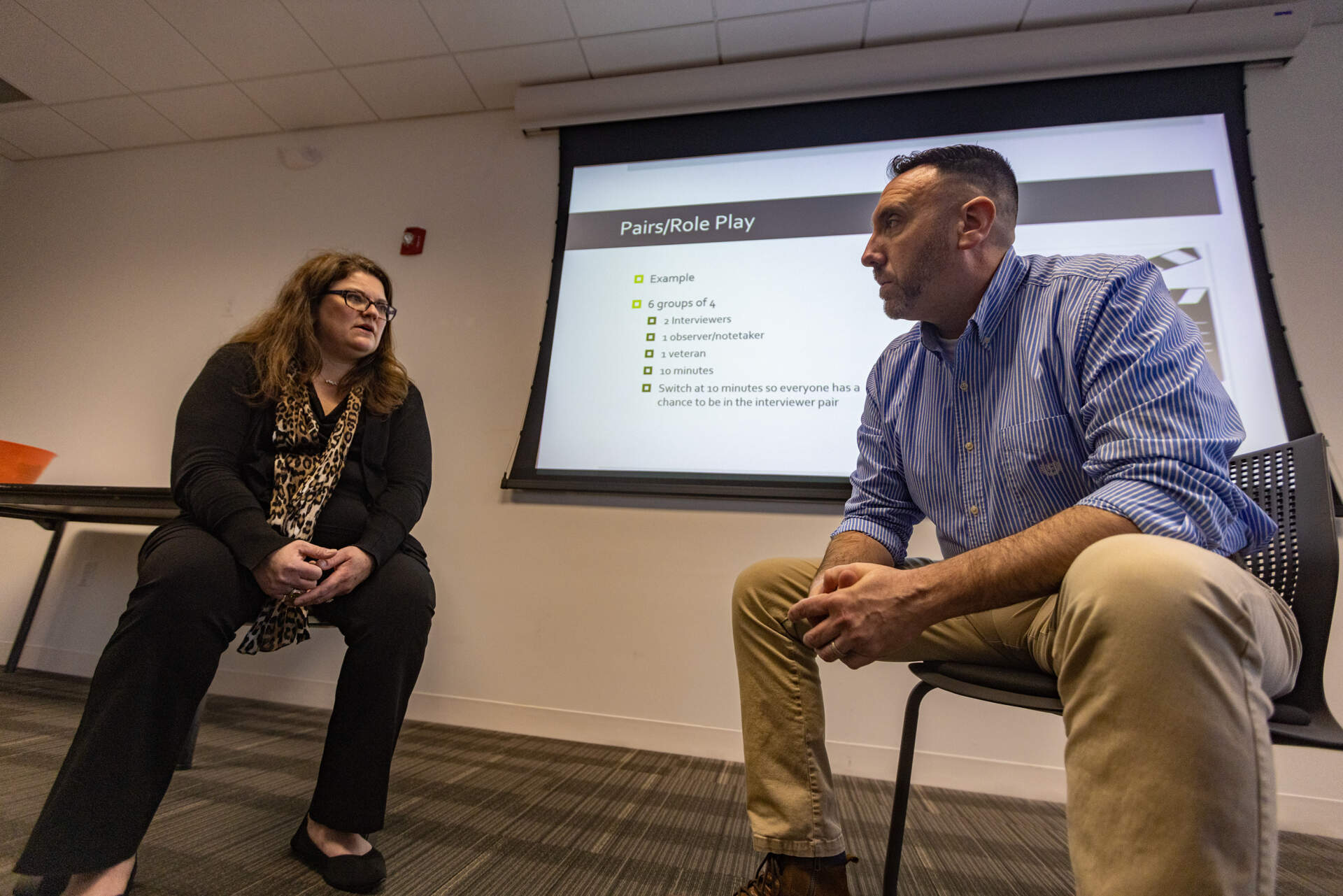
D'Olympia is a clinical psychologist and assistant professor who runs military and veteran psychology programs at William James. She’s also an Air Force veteran who did two tours in Afghanistan and one in Oman.
She told students that research has found reducing access to lethal means reduces suicides. That’s because many people are focused on one method and aren’t likely to look for an alternative. If they do, it’ll probably be a less lethal one.
Class participants learn how to help vets develop safety plans they can turn to if they do get to a point of despair. A veteran can plan to transfer ownership of their gun to someone else who’s licensed to have one, or give that person part of the gun to render it inoperable — or even ask police to temporarily store the weapon, the instructors said. They can also have a back-up plan to protect their home, such as installing a security system, as an alternative to seeing their gun as the primary way to defend their family and themselves.
The program, which is being offered on an almost monthly basis, also covers the state's so-called red flag law, which allows certain people to request a court order requiring someone to surrender their firearms license and guns if they're at risk of hurting themselves or others. But the instructors said their focus is on how to help veterans be in control and make their own decisions.
Trainees in the program role-play as a therapist, advocate or family member and veteran talking about storing the vet’s gun.
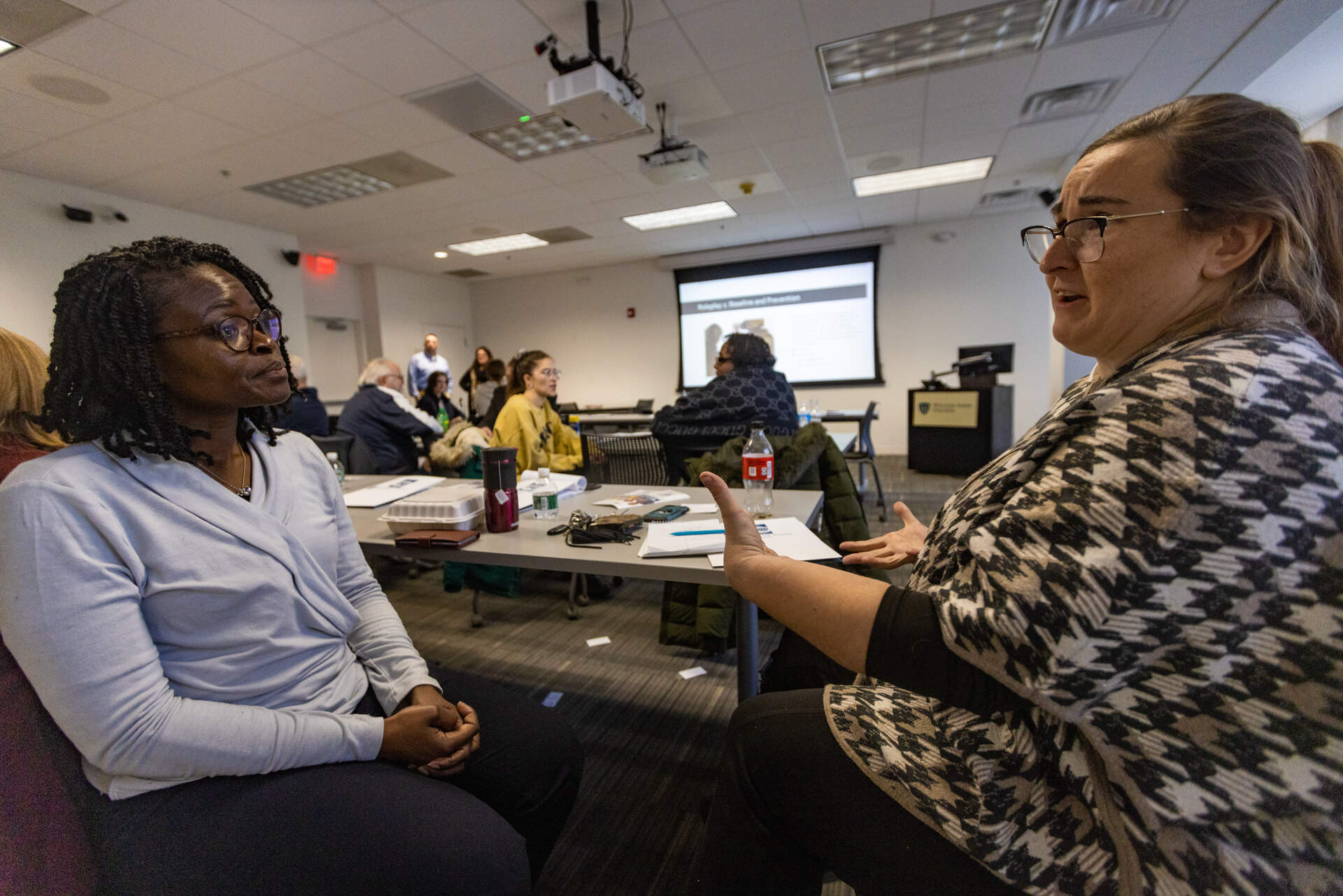
Some of the trainees are veterans themselves and say the class has given them new tools to help their peers.
Jeffrey Hollett, an Army veteran and the city of Haverhill’s Director of Veterans Services, said what he learned will help him go a step further than in the past, when he asked fellow vets if they were thinking of harming themselves.
“What could be lost is the fact that they actually have a gun and you just never specifically asked them that. So this really brings that out — don't be afraid to ask them, ‘Do you own a weapon? Do you have access to a weapon?’ ” Hollett said.
The instructors hope veterans will in turn open up about how they're feeling and realize that their advocates, clinicians and loved ones don’t have a political agenda or want to take away their guns — but do want to keep them safe in the case of a crisis.
Resources: If you or someone you know is in mental health crisis, you can call or text the Suicide & Crisis Lifeline at 988. Service members and veterans can press extension 1.
This segment aired on July 24, 2023.
